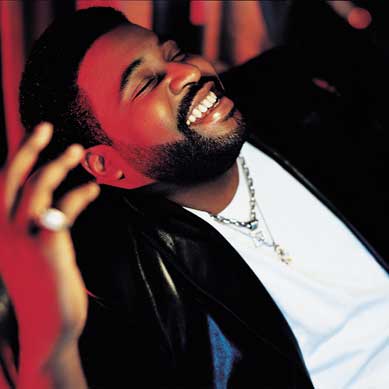R&B Bridgez: Salutes ‘The Teddy Bear’ Gerald LeVert

Gerald LeVert was one of R&B‘s most beloved artists who tragically passed in 2006 at age 40. 32 years ago this month in 1985 he debuted with LeVert. A group he co-founded. Throughout their run, they achieved great success on Billboard’s R&B Charts. Gerald then went solo in 1991 with the debut album “Private Line.” The title track hit #1 on Billboard’s R&B chart. With over 15 albums, Gerald LeVert left a vast legacy.
Gerald Levert’s Memorial Service Program Gallery
Eddie Levert Sr. has started The The Levert Father & Son II Foundation (LFSII), it was established in order to mentor, empower and nurture the growth to social maturity of youth raised in fatherless households.
R&B Bridgez: Salutes ‘The Teddy Bear’ Gerald LeVert
It may seem odd that a career that has spawned 17 gold and platinum records, 15 #1 hits as writer, producer, or performer and countless stellar collaborations, began in darkness. But, imagine a young child, son of a legendary entertainer, who relinquishes his father to the road at an early age. Imagine the loneliness of this child who must share his daddy with the world. Then, imagine his elation when he realizes that the darkness that has hidden his father away will also be the light. This is revealed when young Gerald discovers the gift of music.
While growing up in Cleveland, Ohio, other kids played cops and robbers, but Gerald and his friends pretended to be The O’Jays. Their skateboards and bikes were their tour buses and limos. They were performing their own original songs by the time they were pre-teens. Not that they were child prodigies per se, they were just damn good students. They learned the abc’s of rhythm and blues from Daddy LeVert, and family friends like Teddy Pendergrass. Young Gerald soaked up performance potion and sex-symbol serum like he was starved. He learned by watching, and more importantly, by doing.
Summers were spent touring with The O’Jays allowed him to meet R&B legends like James Brown and one of his major musical influences, the late Marvin Gaye. “During those times, I knew that singing and performing was what I wanted to do. My dad tried to talk me out of it, but it was no use, my mind was made up,” recalled Gerald for his label biography. After many years of mimicking his father’s group, Gerald and his younger brother Sean, along with their childhood friend, Marc Gordon formed the group, LeVert.

By his late teens, Gerald had parlayed his child-play into a fledgling career as a songwriter. He composed song after song for his father’s group, but learned that sometimes it ain’t who you know. The O’Jays passed on the songs, but the cloud of rejection had a platinum lining. Gerald, his buddy Marc Gordon, and his little brother Sean recorded the material for what would become LeVert‘s debut LP I Get Hot.
With Gerald out in front, the trio‘s full-bodied vocals poured over sleek beats earned them much fanfare and a bigger platform for the release of their follow up LP Bloodline. Named in honor of their father’s living legacy, the set secured LeVert‘s first gold record and #1 single entitled “Pop Pop Pop Goes My Mind“.
It was the first success of many. LeVert‘s third LP The Big Throwdown rode the smash single “Casanova” to gold status, while earning the group two Soul Train music awards. This album upped the ante for LeVert, positioning the group to keep the family tradition alive by leaving a trail of hit albums and singles. By the end of their run, the fun-loving yet heartfelt antics of LeVert had garnered the group six gold albums.

He recorded his solo debut Private Line when he was still with LeVert. The other members even contributed to the project. The result was a soul-drenched exploration of Gerald‘s personal musical agenda that still retained some of the familiar LeVert flavor. The spotlight illuminated Gerald‘s flair for chopping up the nuances of love and offering his conclusions on an emotional platter. His particular mix of old school feeling and new school form was most personified on “Baby Hold on to Me“, an electric duet with his father. The old way of flat-footed saanging brought by the senior LeVert blends with the stirring sensitivity of his son to create an urgent appeal. Gerald said of the release, “I was very nervous about the release of Private Line, because I didn’t know how people would receive it or react to me singing by myself.”
On “School Me“, Gerald explores the well-traveled sexual sphere, but hits upon virgin territory. He shows a keen understanding of what all women know: there’s nothing sexier than a man who can take direction. Gerald shows no traces of insecurity as he begs his woman to teach him how to satisfy her. His decidedly un-macho take on male/female relations was refreshing. The music video for the second single “How Many Times” was directed by actress Jada Pinkett. This, along with a compelling emotional honesty, is what motivated many female fans to choose Gerald as their musical partner for life.
It could have been said that once these fans had experienced 100% of Gerald, there’d be no turning back. It could also have been said that once Gerald experienced total artistic freedom, there’d be no returning to the compromise that a group situation demands. But, once again, Gerald‘s case was singular. He continued recording with the group, while pursuing his solo career.
Judging from the music, one can assume that Gerald focused most of his attention on his solo projects. The material was more concentrated, more representative of the artist he was becoming. Without the limitations of a cooperative situation, he could be free as a bird to explore whom that artist really was.
 With his second solo album Groove On, Gerald began sculpting his artistic identity. Perhaps in response to rap’s blunt lyrical style, there was a new straightforwardness in his lyrical approach. Sensual songs like the title cut and “Let the Juices Flow” were more graphic than Gerald had been in the past. But, Gerald still maintained a balance between plain-talk and poetics. On the poignant Love Street, the man reveals where his loneliness resides.
With his second solo album Groove On, Gerald began sculpting his artistic identity. Perhaps in response to rap’s blunt lyrical style, there was a new straightforwardness in his lyrical approach. Sensual songs like the title cut and “Let the Juices Flow” were more graphic than Gerald had been in the past. But, Gerald still maintained a balance between plain-talk and poetics. On the poignant Love Street, the man reveals where his loneliness resides.
This loneliness characterizes the balance of the album’s love songs. They don’t express a physical loneliness, but more of an emotional longing. “I’d Give Anything” the platinum-selling David Foster-produced single pretty much sums it up: Gerald would of give anything to fall in love. On songs like “Rock Me“, Gerald croons about the kind of emotion that could drive a man out of bed in the middle of the night to buy a bag of chips for his woman.
Groove On musically supports that level of emotion. Gerald deviates from rap-influenced programmed sounds in favor of music that caters to the soul. Early influences like Marvin Gaye and Curtis Mayfield shine through in the album‘s lush instrumentation. The warmth of live strings, horns, and basses turn up the aural heat, creating a flawless frame for Gerald‘s fiery vocals. Intricate musical arrangements complement the refined production, highlighting the work of classic craftsmen.
In other words, Gerald stepped up his musical game, raising the bar for other R&B artists in the process. His musical choices separated him from the sea of artists; he began to emerge as dry land in this rolling sea. He was able to endure, as artists interchanged with alarming speed. Gerald‘s longevity could have been inherited from a father who’s in the sixth decade of his career, or maybe it was his ultra-commitment to his music. Whatever the case, by the time Gerald‘s second solo LP had gone gold, he was well on his way to consistency.

“After the success of “Baby Hold On To Me” (duet with his father, Eddie LeVert) from the Private Line album, people kept saying “you guys should do an album of songs together” and we thought about it and said “why not“. So in 1995, Gerald and his father released the critically acclaimed Father & Son album. The two wrote and produced the project, which rose to platinum status. The album became one of those rare musical moments that created an entirely new audience for Gerald, one where families could point to him as a new role model that, symbolized the importance of family. “The whole thing took on a life of its own. I think people saw through us the willingness to endure the scrapes that families go through, and still come out stronger than ever.” Gerald once said. One, of the album’s many highlights was a heart stopping version of the classic ballad, “Wind Beneath My Wings.” Beyond the music, the album was culturally relevant; their mutual love and respect inspired the nation.
The album was a milestone for Gerald since he was able to express on record the expanse of his gratitude to his idol/friend/mentor. Although Eddie had originally discouraged Gerald from pursuing music, he had dropped countless invaluable lessons on his son over the years, ranging from how to negotiate a contract to how to work a stage. Gerald had learned well, and then some, especially when it came time to performing. When the two took their blowout show to the stage, it had become obvious that the younger LeVert‘s stage tactics were just as formidable as his father‘s. By watching his dad perform over the years, Gerald had learned to make love to the music.
Now, he worked it and worked it and just wouldn’t stop until the crowd screamed. In city after city, the combined efforts of father and son worked the crowds until they exploded.
Gerald also wrote for and collaborated with numerous other successful artists, such as Patti LaBelle, Tamia, Anita Baker, New Edition, Miki Howard, Regina Belle, Barry White, Teddy Pendergrass, TROOP, Stephanie Mills, Silk, and the Winans. Through his own label, Trevel Productions, which he co-owned with Sean and Marc, he oversaw the development of new artists from Cleveland such as the Rude Boys, Men At Large, 1 of the Girls and Drama.
He wrote and produced major hits for those artists and occasionally lent vocals. He sang on Chris Rock‘s comedic club-hit “No Sex in the Champagne Room” & Yo-Yo‘s “Iz It Still All Good,” and contributed his vocals to Black Men United (B.M.U.)‘s “U Will Know” from the “Jason’s Lyric” soundtrack. Gerald always kept fans on their toes with his R&B projects.

All of those collaborations groomed Gerald for his biggest one: LSG. The brainchild of Keith Sweat, it was originally slated to feature R. Kelly, but scheduling conflicts cleared the way for the final lineup of Gerald (L)evert, Keith (S)weat, and Johnny (G)ill. Judging from fan reactions, it shouldn’t have been any other way. “My Body,” the group’s first single soared to the top of the charts and gave them their first platinum single. “The whole experience was great,” Gerald said. “Those guys are legends, and they knew what it takes to get the job done. I gained so much from that process“.
In a rare instance of musical synergy, styles, talents, and images fused to form a whole that was greater than its parts. The healthy competition between the members allowed them to push themselves and each other further. Thus they were able to reach a level of craftsmanship in a short amount of time that would have been harder to attain if each man were working alone. The clever “Door #1” is a definitive example of what a little teamwork can accomplish. The performers’ individual attributes shine in a way that doesn’t detract from the group. The dynamics that Gill‘s gospel-tinged riffs, Sweat‘s achy adlibs and Gerald‘s soul-to-the-toes delivery provided amplified the aural energy level.
Contributions from LL Cool J, Busta Rhymes, Missy Elliot, Coko and others cranked up the party a few more notches. The final product was an all-star extravaganza that remained intimate enough to showcase both the individual and collective talents of the group. Considered by some to be a risky experiment with built-in kinks, at the end of the run, which included a lucrative US concert tour, LSG was considered to be an all-around success.

Fresh from the creative high of LSG, Gerald was ready to tackle his own issues of life and love. Personal and professional maturity had given him license to turn some of his most complex interactions into song. Love & Consequences, his third solo LP, is the product of this introspection. The album features the Top 20 singles, “Thinkin’ Bout It’” and “Taking Everything” and the track “That’s the Way I Feel About You” is a beautiful duet with Mary J. Blige.
“I kept thinking of Marvin Gaye, and I felt this “What’s Goin’ On” type of thing when I began the record.”
Gerald stated for his label biography, he went on to say “I’m at an interesting place now in my career where I’m seen as a mature artist, but through my different experiences all audiences can relate to me and that’s what I went with for this album.”
This time around Gerald deep-focuses on the inner workings of a relationship. There are no more frilly concepts of light and airy love. Gerald‘s love is dark, thick, and salty. Nothing is simple. His newfound respect for realistic portrayals of love over romantic portrayals could have been the result of a broken love affair. You could assume that he dogged or was dogged. Or, you could credit his natural progression as an artist into one who was no longer satisfied with skimming situational surfaces. With lyrical shovel in hand, Gerald was down to do some digging.
Unfortunately, sometimes there’s no digging allowed in the music business, even if all you’re searching for is a little truth. A youth-oriented business such as this often demands that its suppliers keep it fun and simple. If an artist gets too deep, it’s feared that his message will fly right by the listening public’s tender ears. In Gerald‘s case, the fact that he was already considered to be an adult contemporary artist made the situation even more precarious. He could have A) caved in to executive pressure and made an album that was suitable for younger audiences or B) made an album that was suitable for him. Instead of stressing over how to make an album that appealed to the mind of a child, Gerald skipped the issue entirely. He compromised and made an album that appealed to the body.
 Gerald‘s position was that if you hit anybody with a groove they liked, they’d connect. Creating an album full of urban radio-friendly grooves freed him to lyrically speak volumes, and not necessarily on the ever-popular (though rather adult) subject of sex, sex, sex. Hence Love & Consequences was consequently lovely, despite the struggle that surrounded its conception. On the ominous “Point The Finger“, featuring Sean LeVert, Gerald touches on friction-split relationships. He sits his little brother down for a heart to heart about the changes that love has put them through. The love they speak about is filled with losers and indo smoke, ghetto girls and cash money. Gerald wants his lady to remember that when she points the finger at him, the focus boomerangs right back to her. This is a souped-up soul version of the old adage that if a person is over-suspicious, they’re usually the one with something to hide.
Gerald‘s position was that if you hit anybody with a groove they liked, they’d connect. Creating an album full of urban radio-friendly grooves freed him to lyrically speak volumes, and not necessarily on the ever-popular (though rather adult) subject of sex, sex, sex. Hence Love & Consequences was consequently lovely, despite the struggle that surrounded its conception. On the ominous “Point The Finger“, featuring Sean LeVert, Gerald touches on friction-split relationships. He sits his little brother down for a heart to heart about the changes that love has put them through. The love they speak about is filled with losers and indo smoke, ghetto girls and cash money. Gerald wants his lady to remember that when she points the finger at him, the focus boomerangs right back to her. This is a souped-up soul version of the old adage that if a person is over-suspicious, they’re usually the one with something to hide.
On “No I’m Not the Blame” Gerald retaliates against the guilt his woman is lying on him. He wants her to recognize that he’s the same man she met. He’s the same man who gave her everything she wanted. His behavior hasn’t changed, so why has hers? This is a tough question, and the possible answers are infinite. The worth lies in the fact that someone’s asking the question, working both our bodies and our brains.
On the intro to another rump-and-reason-shaker, Wyclef Jean asks, “What happened to the old records?” The answer is not a thing. “No Man’s Land” is an intersection of past times and current impressions. The plaintive sounds balance on the cusp of hip-hop, blues, reggae and soul. Over quiet chaos, Gerald offers fragmented images of a cracked world, much like Marvin Gaye‘s musings in his classic “What’s Goin on?” Gerald‘s whispery performance conveys the frustration that has sent him packing for no man’s land, as the spoken refrain “what happened to the old records?” weaves strategically throughout the piece.
At some points, we hear “what happened to the old days?” Once, we hear “what happened to the old prophet Marvin Gaye?” Then, lost in thought, we realize the words have never changed. The final cut on Love & Consequences is equally magical. “Humble Me” featuring Gerald‘s son Lemicah focuses on familial love. It’s guaranteed to plaster a silly smile on every listener’s face. The love between father and son radiates, warming everything within distance. Gerald sings of feeling humbled whenever he sees his son’s smiling face, and we understand why. The boy is clearly charming. We hear snippets of their conversation; his childish candor is refreshing.
The most touching part of all is when Lemicah imitates his father‘s adlibs near the end of the song. During the short call and response section, it’s evident that the younger LeVert has a great ear and a rapidly developing voice. He knows how to respond when his father asks him if he has anything to say to his fans. “Thank you everyone for loving me!” Spoken like a true pro.
The fact that Gerald shares something as precious as his son is endearing. Without even trying, the song contains the most moving moments on the album because nothing is more genuine than true life and love. “Humble Me” contains both. The maturity that allowed Gerald to seek new creative heights was as inevitable as the personal and professional trials he faced to gain it. He had to face those obstacles, so that he could grow stronger. The growth is the point. Everyone must grow, even 18-24 year old urban radio listeners. The earth’s cycle demands it.

With the release of his fourth solo album G, Gerald had come full circle. His artistry was at its fullest. His grasp of life was at its strongest. He had mastered the creative tools necessary to capture his perceptions. The stories on his lips were weighty so he dropped them onto wax.
“She Done Been” shouts out to the average black woman. Gerald wants her to know that someone out there recognizes her plight. The voice never lies. Gerald‘s contains too much truth. The protagonist in his song is trampled by her own desires. She wants a man, and gets one. He proceeds to cheat, beat, lie, and leech his way into her heart. The only way to stop wanting him is to stop her heart from beating. Life goes on. The whine of melancholy violins heightens the drama as Gerald‘s heroine is trapped, but fails to see. She’s tired, but keeps on moving. She’s hurt, but keeps on dancing. The beat goes on.
Gerald‘s crying for her, but she doesn’t hear him. She’s too busy hearing the front door slam her man’s hello. Gerald‘s calling for her, but she doesn’t know it. She’s too busy answering to bitch and hoe. Gerald‘s looking for her, but she’s not around. She’s caught up in the things she’s been. Preacher-teacher-mother-father-daughter-fighter-banker-counselor-maid. She can’t find a man who done been half the things she done been.
On “Heart Don’t“, Gerald turns the magnifying glass inward and doesn’t shrink from what he finds. Essentially, the song is about trust–the self-trust one must have before it can be placed in another. Gerald‘s got issues with trust. Repeated encounters with an inner compass that steers him wrong has made him wary of his own judgment. He’s skeptical of his own feelings. But, a man who encounters sexy beasts that feed on men for their survival must be.
Jezebels and gold diggers lie in wait for men who decide with their eyes, ears, and brain, anything but their hearts. These lovely liars are afraid of hearts; they know that hearts are never wrong. Men who follow their hearts will see straight through to theirs, steadily pumping for cash. These women prey on men whose hearts don’t tell them that they’re wrong.
 From the slinky blues and gospel tones of the opening riffs, we hear it coming. “Misery“, and it loves company. Our interest peaks. Gerald‘s voice enters, teasing us with the promise of what is to come. Gerald delivers a dramatic tale of betrayal at the hands of his best friend. In this saga, a friend in need becomes a friend who bleeds, after Gerald opens his home to a man who slyly pursues his woman. Gerald sings from deep in his gut, tapping into the muddy waters at the bottom of his soul. He’s hit upon the dank and dirty waters, the bluesy waters that once spouted the old Negro spirituals.
From the slinky blues and gospel tones of the opening riffs, we hear it coming. “Misery“, and it loves company. Our interest peaks. Gerald‘s voice enters, teasing us with the promise of what is to come. Gerald delivers a dramatic tale of betrayal at the hands of his best friend. In this saga, a friend in need becomes a friend who bleeds, after Gerald opens his home to a man who slyly pursues his woman. Gerald sings from deep in his gut, tapping into the muddy waters at the bottom of his soul. He’s hit upon the dank and dirty waters, the bluesy waters that once spouted the old Negro spirituals.
Joined by a choir of whaling guitars and hollerin’ horns, Gerald testifies with guttural groans and moans about right and wrong, friends and enemies, happiness and envy. His pain seems to be physical at times; rage, disappointment, and scorn have beaten him into oblivion. In this state, Gerald‘s unpredictable. His voice is like a loaded gun, ready to do some serious damage. His friend better get to steppin’ before Gerald puts him out of his misery.
The entire album represents an artist at the peak of his game. Gerald‘s casual control over the elements that make good music means he will never fail. He will always have a platform from which to create; he’ll always have listeners. To have reached this point in a creative career is a definite achievement, beyond the measurements of records and charts. It’s a personal achievement, one that can never be taken away.
When the new Millennium broke, Gerald became the master of his musical universe. The creative child within became the man. He switched to Elektra Records and the journey continued with Gerald’s World, the first single “Made To Love You,” a wrenching song that reminds us why we were made to love Gerald. The agape love he expresses for his destined mate erupts from him. We feel it brushing across our skin sending shivers. We press repeat…
Two mediocre albums “The G Spot” & “Stroke of Genius” were followed by his Atlantic Records debut, “Do I Speak For The World,” which marked his notable return to form.

Sadly, Gerald LeVert passed away of a heart attack in November 10th 2006 caused by a fatal combination of over-the-counter and prescription drugs. At the time Gerald LeVert‘s family issued the following statement: “Gerald had several health issues including a severed Achilles tendon and lingering shoulder pain, among other things, that required him to take prescribed pain medications. We had no idea that this would be the cause of his death. Unfortunately, we can’t turn back the hands of time, for if we could, he may still be with us today. We accept what has been reported and thank all of Gerald’s family, friends and fans for their continual outpouring of love for our loss.”
 His final studio album “In My Songs” was posthumously released in February 2007. The singer/songwriter had completed work on it just before his untimely death in November 2006. The album is old-school R&B at its best, with up-tempo gems like“DJ Don’t” and “Wanna Get Up With You”, alongside some of the most passionate ballads Gerald ever recorded. Including the 2008 Grammy-winning title track, for Best Traditional R&B Performance.
His final studio album “In My Songs” was posthumously released in February 2007. The singer/songwriter had completed work on it just before his untimely death in November 2006. The album is old-school R&B at its best, with up-tempo gems like“DJ Don’t” and “Wanna Get Up With You”, alongside some of the most passionate ballads Gerald ever recorded. Including the 2008 Grammy-winning title track, for Best Traditional R&B Performance.
Throughout his career Gerald LeVert achieved 5 Platinum albums. He wrote, produced or both; 15 #1 R&B hits for himself and for an all-star list of other artists.
Gerald is extremely missed.


Add to your G playlist. Download all of the music on ours and more.

Watch All of Gerald‘s music videos on his YouTube playlist, courtesy of Atlantic Records.



















What a wonderful honor to Gerald.
Gerald was a one of a kind guy….he brought so many people together with our love for him …friendships that still last 10 years later,bonds that will never be broken..almost any state I travel 2 I can find a GPHIG lady nearby or as I did this weekend I can send out a message to my GPHIG sisters for a getogether and will have no less than 6 of them show up at a minutes notice from all over .. all for the love of Gerald …GPHIG for life !